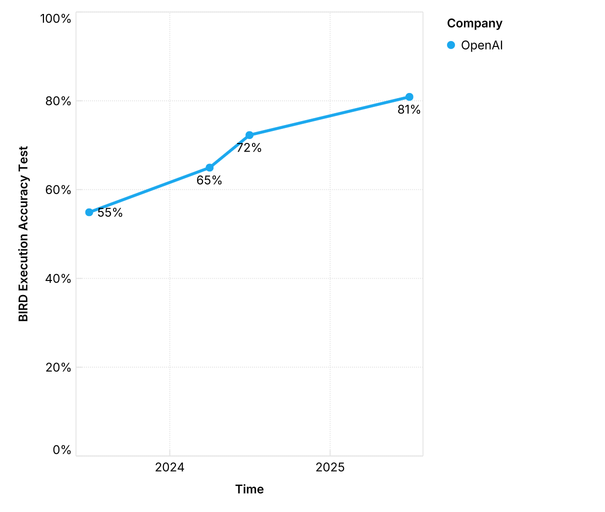The three most important jobs for analytics teams in an AI-first world
(and it’s not context engineering…)
It’s becoming clearer and clearer that LLMs are capable of doing a lot of the heavy lifting that has plagued analysts for decades. Analytics agents can write code faster, dig deeper, and offer flexible access to data for the wider business.
With these activities currently taking up so much of an analytics team’s time, it’s natural to wonder what the role of an analytics team looks like in the future — and even whether there is a role at all.
If this is something you’re thinking about, I want to use this article to make the case that in an AI-first world, the role of the analytics team is going to become even more important by focusing on three universal truths.
AI is getting really good at analytics
We've seen it coming over the past few years. At first we scoffed at the irrelevant answers and hallucinations, but now things have changed. AI is getting very very good at analytics. Yes, it makes mistakes, but increasingly these seem understandable — mistakes even a competent analyst could make if they also didn’t have the right institutional knowledge. But when that’s available, more of us have to admit - we’re quite impressed!

You can see this in the benchmarks. The percentages don’t lie and, though you can argue these tests can be gamed, progress has undeniably been made. Now it feels like the accuracy (or, as some call it, utility factor) has approached a critical threshold where the speed and reliability is enough that magic can happen.
For what it's worth, at Count we think the moment is now. We've been experimenting with AI models in our platform for over 18 months — playing, tinkering with what's possible. Then, earlier this year, these models suddenly hit a critical threshold where wonderful experiences became possible. The accuracy, depth, and speed with which AI can now dig into data matches or even surpasses the best human analysts.
So with this backdrop, it’s understandable many people in analytics are starting to get a bit worried. If an AI is better at data modelling, writing SQL, and presenting charts, then what is left?
I want to argue that, the future of analytics is actually very bright. Different, but no less essential to businesses. In fact, it could be more so.
Three universal truths to bet on
Here are three universal truths that I think form the basis of the answer:
1. Not all charts are equal
In a world where the effort to get “insights” is approaching zero, the bottleneck of creating value from data shifts from producing charts to creating clarity.
This is more than just context engineering (as important as that will be for producing accurate, reliable numbers), but about the analytics team being a beacon of truth that allows the business to focus on what matters.
In many data teams this is something they already know. In a world where self‑service analytics is already somewhat happening (be that via spreadsheets or “low-code” rather than AI) and every SaaS tool providing its own in‑built dashboards, metric sprawl is real. It’s already far too easy for every individual in a company to have their own view of what matters, and AI chatbots risk making that even more so.
We call this move — where analytics teams go from “data givers” to “truth bringers” — operational clarity. It’s about creating as much focus and alignment in the business as possible, using fewer, better metrics to define the business’s operating model, mapping that to owners, and driving change by focusing on understanding the operational levers that move metrics.
2. Insights don’t necessarily lead to action
Despite what people may think, the strength of a data team is not in technical skills. Analytics teams already exist as translators between numbers and the business and, though that does mean using a bit of SQL or Python, it’s the ability to turn that analysis into a decision which really matters.
In a world where an AI can write better SQL than most humans, the strength of an analyst will increasingly come from their problem‑solving and telling stories which lead to action (i.e. building a case for change). In most cases, analytics teams are already the best problem solvers in most organisations, and AI provides the space and tools to allow them to really lean into this strength to become the “problem‑solving hit squad of the business”.

An AI can give everyone answers but that doesn’t necessarily mean it’s going drive the business forward if no one can agree.
This means collaborating and thinking critically across functions to bring the business together to make meaningful, impactful decisions which the business can trust because it’s structured, verified, and carefully communicated by humans leveraging AI to go deeper than they had time to before.
Ultimately, it’s not time-to-chart which matters, but time‑to‑decision — and that means building human consensus.
3. Executives will always need help to think
The amount of information an exec has to wade through on a daily basis is sizeable. Slack DMs, dashboards, reports, meetings — low‑level to top‑level — there are numbers everywhere, and the problem is only going to grow as more of the business becomes automated.
In many ways this links to our first core truth about creating operational clarity across the business, but there’s something more to call out here.
The best analytics teams are often positioned as “trusted advisors” to a company’s leadership — helping them think, be objective, and distil truth — and the need for that role is never going to go away and will always be valued. Plenty of analysts have found themselves moving quickly into positions of responsibility and leadership via this route, all because they were analysts first.
In a world of AI where data can be analysed at close to the speed of thought, the need for analytics teams to cut through the noise, focus on decision‑making, and support leadership with clarity of thought is going to remain.
This is something the best analytics teams are already doing, but AI now helps everyone remove the legwork and finally fulfil their potential and make data a strategic weapon of change. I’m excited, and I hope you are now too.